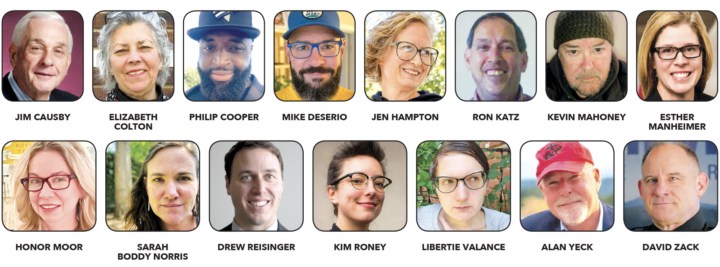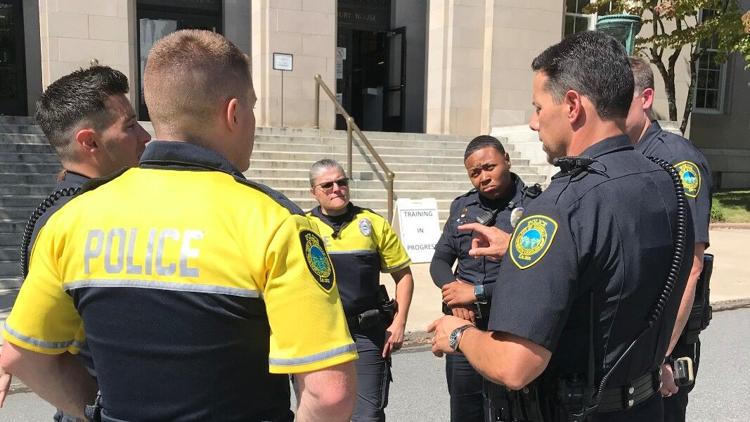“CRIME SOARS IN DEM-RUN TOURIST TOWN,” screamed a Fox News chyron in September, as a network report labeled Asheville one of America’s most violent cities.
Tucker Carlson and other Fox personalities joined the pile-on, blaming city leaders for a 31% increase in violent crime. The news channel claimed the city was an antifa hub and that there was “evidence of increased Mexican drug cartel activity.”
Much of what Fox reported has been debunked as false or misleading by Asheville Watchdog and other news organizations. For example, the reported 31% crime increase referred to a period ending in 2020, and the violent crime rate actually decreased in 2021. (Violent crime went up again in 2022, according to the Asheville Police Department.) Buncombe County Sheriff Quentin Miller says he’s seen no evidence of Mexican drug cartels operating locally.
Nonetheless, the nation’s most-watched cable news network shined a spotlight on crime in Asheville this year. And there is no doubt public safety, fentanyl use, law enforcement and homelessness were on people’s minds, even when they weren’t topics featured on TV.
As Asheville Mayor Esther Manheimer put it: “Crime is a serious issue and one that I hear about as a top concern for our community.”
Xpress asked activists, law enforcement leaders, government officials and others to weigh in on how local crime and related issues shaped 2022. 
Has Asheville become more or less dangerous over the last year? If you’ve seen a change, what part of town do you have in mind?
“I live and work downtown. Three years ago, I felt perfectly safe going out and walking home at night. Things have changed since then, with this year being the worst for me. I don’t feel safe walking around downtown after dark at all. The last time I did so, I had a knife pulled on me right outside my building. I can’t imagine having to park far from work and walking back, alone, after a closing shift.” — Jen Hampton, organizer, Asheville Food and Beverage United
“I don’t feel personally unsafe. I do see ever more space in the city being ceded to tourists, such that locals trying to live their lives, get by and share with each other aren’t welcome in public space. And that feels unsafe. One of the most upsetting examples is parks, especially Aston, where unhoused folks and locals doing food sharing have been targeted and chased off so visiting tennis players don’t have to see poor people.” — Sarah Boddy Norris, activist and teacher
“Asheville is experiencing a historical rise in violent crime. There has been a 70% increase in violent crime (homicide, rape, robbery and aggravated assault) this year compared to the average of the last 10 years. So far in 2022, there have been 11 homicides, the second-highest count since 2018.” — David Zack, chief of police, Asheville Police Department
“I certainly don’t see it becoming less dangerous, especially to our more vulnerable population that can’t even get into cold-weather shelters.” — Kevin Mahoney, peer support specialist
“I think everywhere has become more dangerous. The national system for mental health in this country is our prison system. People suffering from mental and emotional health issues are incarcerated instead of being given the resources to heal and become a functioning part of society. All of our major systems are broken. Systems that were developed to help the people have morphed into systems whose sole purpose is to protect themselves.” — Alan Yeck, executive director, Veterans Healing Farm
Are you confident local law enforcement is keeping the area safe?
“Goodness, no. APD spent $125,900 for a PR firm to make them look less terrible after the nationally embarrassing destruction of a medic tent during 2020 protests and ongoing, documented racism in practices and outcomes. APD has used significant public resources criminalizing 16 local mutual aid organizers whose political speech they don’t like for ‘felony littering.’ (I am one of them.) Relationships and communities are what keep people safe.” — Sarah Boddy Norris
“I trust in our institutions in general, especially those locally. However, I also believe that citizens need to hold those institutions and the leadership accountable. To me, that means there must be mechanisms for all people, especially those who have been victimized in the past, to file complaints and get quick resolution.” — Ron Katz, social justice advocate
“I’m distrustful of law enforcement services in their current form/culture but am respectful of those officials and officers who try and do their jobs.” — Kevin Mahoney
“Asheville is an incredibly safe place to live despite what Fox News has told folks. The city of Asheville’s Crime Stats page shows a 20% drop in the worst crimes (murder, assaults and sex offences) over the past year and a 20% drop in property crimes. But the biggest success story of 2022 is … Sheriff [Quentin] Miller’s partnership with EMS. Now 911 overdose calls can be deferred to the better-equipped Community Paramedic program.” — Drew Reisinger, Buncombe County register of deeds
Do you think the use of fentanyl and other opioids has affected public safety?
“Absolutely, and we have felt the impact firsthand in our daily work with people in need. The amount of funerals we have attended this year has been more than the last few years combined.” — Mike DeSerio, AHOPE outreach program manager, Homeward Bound
“Fentanyl is taking people out. It’s heartbreaking. Prison saved my life. My recovery journey began while I was in prison, which means that I missed the opioid storm. I have friends who have died from overdoses. So yes, public safety has been compromised, as the streets are more dangerous than ever. But let’s not make it an ‘opioid thing,’ but rather a substance misuse issue, so that people are not left out of the equation.” — Philip Cooper, INspire Project coordinator, Land of Sky Regional Council
“Fentanyl and other opioids affect the safety of a community, families and individuals. The city received $1,519,518 in funding from the National Opioid Settlement. The city approved hiring a position to work with partners on a strategic plan and use of the settlement funds. Because of the correlation between the opioid epidemic and housing instability, this position will work closely on the intersecting issues of homelessness, affordable housing and economic development.” — Esther Manheimer, Asheville mayor
“Of course, it has; all street drugs have a potential death warrant attached to them. The communal side effects of opioid use include increased police, EMS, homelessness, medical (think of massive hospital bills from endocarditis), unemployment and educational deficits.” — Kevin Mahoney
“The most common low-level crimes are mostly committed by persons with opioid addictions, usually in the direct pursuit of fentanyl. For the past year, in most shootings where a motive is established, that motive is a dispute that has escalated rapidly to an absurd degree. Many of those involved have some connection to the drug trade. Overdoses have increased significantly over the past two years.” — David Zack
“Criminalization is deteriorating the quality of life for everyone in Asheville, and the city’s plan to ‘reimagine public safety’ has been a failure by design. Evidence-based solutions — including harm reduction and access to treatments like methadone or buprenorphine — remain underfunded and undersupported, but the city and county continue to increase resources for surveilling, policing and imprisoning our neighbors. Asheville desperately needs decriminalization, coupled with the diversion of millions from law enforcement to community-controlled health and safety initiatives.” — Libertie Valance, co-owner, Firestorm Books & Coffee
What do you think were the main drivers of crime in 2022, and how has the city responded to them?
“The main drivers of crime are a combination of Asheville being the largest western city in North Carolina and our growth in recent years. We have the highest amount of services for houseless people at this end of the state. More are coming here for those services, and stats show that at least 20% of the crimes being committed are from that population. Tourist cities often have an increase in drug use. With that also comes more crime.” — Honor Moor, playwright/nonprofit board member
“Some of the main drivers for crime in 2022 are actually complex interrelationships between increasingly widespread tolerance of disrespect of neighbors and fellow citizens coupled with cultural displays of disrespect for civil servants and civil safety personnel. These are shown in words, action and funding. Local politicians and all community leaders can lead by example in speaking out always in promoting respect for all our fellow citizens, neighbors and our civil and public safety personnel.” — Elizabeth Colton, diplomat- and journalist-in-residence at Warren Wilson College
“I think the main drivers of crime in 2022 are the proliferation of guns, the shortage of police officers and the increase in the sale and use of illegal drugs. I think the city has responded as well as can be expected with the challenges they face with a significant vacancy of police officers.” — Jim Causby, interim superintendent, Asheville City Schools
“Poverty. For years, there have been calls to action to address affordability and disparities in the social determinants of health. Now we’re behind in addressing root causes of crime, yet we have the most resources our community has ever known. The biggest hurdle in meeting this moment is stubborn attempts to return to business as usual. My heart yearns for us to keep growing through lessons learned, to have enough courage to change and to make space for what’s possible.” — Kim Roney, Asheville City Council member
“APD’s staffing crisis has played a role, as our lack of presence, particularly downtown, hasn’t had the deterrent factor it once did. This year we have seen an increase in violent crime driven primarily by aggravated assaults. Gunshot victims and shots-fired calls for service are also up slightly after a significant reduction in 2021. Hopefully, our continued focus on gun violence can reduce the harm created by those offenders.” — David Zack




Exactly why I called for the Asheville-Buncombe Public Safety Action Plan. Diverse voices are okay. But public safety isn’t guesswork.
https://mountainx.com/opinion/letter-wheres-the-public-safety-action-plan/
Interesting piece. It slants a bit because of the nearly exclusive focus on ‘politicians’ and ‘public figures’ .
I suspect a poll of ‘non aligned ‘folks would tell an interesting and different story.
Love to be able to read a wide swath of viewpoints all in one space. Great job, Mr. McGuire!
Confusion Junction, USA
Let’s not kid ourselves, Ashville’s sky-rocketing crime does in fact have multiple root-causes, with poverty, hard drugs, and the biggie being the single-parent homes of minorities and unaccountability of their actions. Criminals lurking in the shadows see tourists as ‘targets of opportunity’ along with everyday citizens.